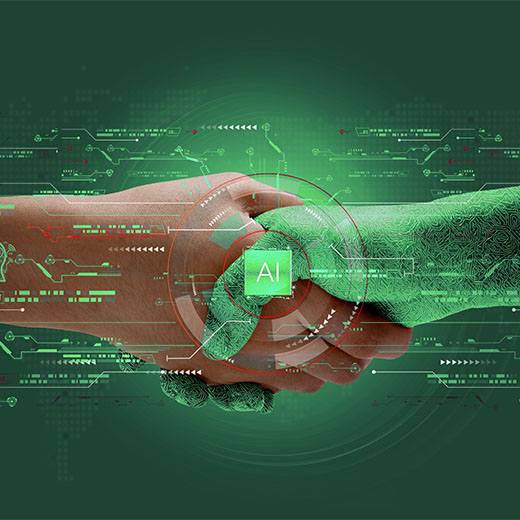Artificial intelligence (AI) is changing the way many people work, and the recruitment industry is no exception. Whether you’re excited or worried about technology, the growing capabilities of AI can help revolutionize recruitment in many ways. In this article, we look at how AI is changing our industry and explain why Recruit Action is taking a cautious approach when considering AI as part of its business.
Before we look at how AI will influence recruitment, let’s review the history of this technology. The beginnings of artificial intelligence date back to the 1950s, when scientists and mathematicians first used the term. They believed that machines could be programmed to simulate human intelligence, performing tasks such as problem-solving, reasoning and learning. At the time, AI focused mainly on the development of rule-based systems, which relied on a set of predefined instructions to make decisions. This early research was promising. However, the computing power and data analysis capabilities of the time severely limited their capabilities. In the 60s and 70s, AI research turned to the development of advanced algorithms for learning from data. This process of machine learning led to breakthroughs in language processing and in the ability of computers to see and understand the world as humans would. Then, in 2010, cloud computing and advances in deep learning led to a quantum leap in the development of machines capable of replacing humans for certain tasks, in industries such as recruitment.
In the world of recruitment, AI can be used to perform many tasks, replacing some human workers. We’ve identified six areas where AI could save us time and improve efficiency.
Automated selection: AI processes can analyze resumes, cover letters and online profiles, to detect the best candidates for a position. Algorithms can also match qualified candidates to job descriptions, skills and qualifications, reducing the time and effort required to select candidates.
Improved candidate experience: AI-powered chatbots can respond instantly to candidate queries, schedule interviews, and keep candidates informed about the status of their recruitment process. This round-the-clock support can enhance a candidate’s recruitment experience and have a positive impact on their perception of the company.
Reducing prejudice and other negative biases: AI can help eliminate unconscious bias during the recruitment process by flagging patterns of prejudice, so that a human recruiter can review them.
Predictive analysis: AI can rapidly analyze CV data to predict which candidates are most likely to succeed. This IT assistance can enable recruiters to make better hiring decisions and reduce the frequency of staff replacement.
Skills mapping: AI algorithms can analyze candidates’ skills, training and experience to determine the most suitable position for them within the company.
Talent spotting: AI can analyze job boards, social media and professional networks to identify potential candidates with the skills and experience required for specific positions. AI can also help build a database of potential candidates for future vacancies.
Administrative competence: AI can automate time-consuming administrative tasks such as scheduling interviews, emailing and following up with candidates, so that the recruiter can concentrate on other tasks.
AI undoubtedly has the potential to transform the sector, by streamlining the recruitment process, making it easier to spot talent and improving the candidate experience. However, in-depth discussions with our team, candidates and customers have identified several aspects of the recruitment process, where AI won’t be able to help. Here are seven reasons why we believe AI will not be able to fully replace human recruitment:
The human approach: While AI can automate tasks, it cannot simulate a human approach. A recruiter can cultivate empathy, develop authentic relationships with candidates and customers, and provide feedback on CVs, applications and mock interviews. A human recruiter can see, hear, think and feel beyond the information contained in a CV and database, so candidates are more likely not to be eliminated solely on the basis of a document.
Emotional intelligence: Recruiters have the emotional intelligence to understand and respond to candidates’ feelings, needs and motivations. Emotional intelligence is essential for building the trust required to develop a genuine relationship.
Unstructured data: While AI can analyze structured data, such as CVs and online profiles, it struggles with unstructured data, such as facial expressions, body language and tone of voice. These elements linked to a person’s emotions are essential for analyzing a candidate’s interpersonal and communication skills.
Flexibility: AI is programmed to produce results by following specific rules and procedures. However, a human recruiter can adapt to changing situations, adjust his or her approach according to circumstances, and provide solutions to meet the needs of different types of candidates.
Human judgment: While AI can provide technically sound recommendations based on data, it cannot make the final decision. Recruiters use their experience and judgment to assess whether a candidate is suitable for a position, and have the power to make the final choice.
Diversity and inclusion: AI can be biased, as the data used to design its processes can be biased. Human recruiters can consciously eliminate bias and encourage diversity and inclusion throughout the recruitment process.
Creativity: While AI’s design and capabilities are incredibly creative, AI cannot develop imaginative recruitment strategies, write bespoke job descriptions and collaborate with other recruiters, to devise innovative ways of attracting talent.
Recruit Action is aware that AI is transforming and will continue to transform the recruitment industry. However, we believe that AI cannot completely replace recruiters. Our team of recruitment experts has the emotional intelligence to offer a flexible, creative and compassionate human approach that embraces diversity and inclusion. American researcher Eliezer Shlomo Yudkowsky once said, “The greatest danger of artificial intelligence is that people conclude too soon that they understand it.” We think Yudkowsky’s words are wise, and while we see the potential for AI to help our business, we plan to cautiously explore how AI can enhance our human approach to recruitment, rather than replace it. We plan to optimize the speed and efficiency of our recruitment process without sacrificing the empathy, understanding and human connection we value above all else.
Feel free to contact us to learn more about our thoughts on AI and the recruitment industry.




